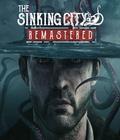Pre-order The Sinking City
Games based on the Cthulhu mythos are abundant to the point of becoming clichéd. Almost all of them are set on the East Coast of the U.S. in the 1920s. There's always the notion of supernatural beings coming from the seas, and you always play the outsider who isn't welcome in these parts. To hear that The Sinking City is using that as its story crux isn't that exciting until you learn that the developer is Frogwares, who's mostly known for its Sherlock Holmes series of games.
The game places you in the shoes of Charles Reed, a private investigator suffering from horrific visions of giant creatures in a world filled with strange architecture and other oddities. Wanting to solve his issues, he learns that the town of Oakmont, Mass., has been plagued with people who are suffering from similar visions. He goes to the town to discover that the place seems to be experiencing endless rainstorms that have begun to flood the place. He has to discover why he's seeing things before finding a way to escape from the town.
Aside from the standard Lovecraftian traits, like strange-looking humanoids and the angry insular people of a fishing town, the first thing people will notice is how similar the gameplay is to the recent Call of Cthulhu. Your goal is to investigate the crimes and other mysteries in town to get people to give you better answers about your condition. Part of this will require going to specific locations, gathering clues and examining them to get an idea of what has occurred. Other times, you'll be able to call on your supernatural powers to see beyond the normal world, re-create past incidents, and follow spiritual guides to locate your next big clue or answer.
This detective mechanic goes one step further, as you'll have to go into your own mind to piece together the clues and their relationship to one another. Those conclusions form into bigger questions until ultimately, you have one of two definitive conclusions. Most of your detective time is spent searching for dots to get what you need to progress.
Getting to the scene ditches any sort of hand-holding. While a few locations are placed on your map from the outset, more aren't added until you discover them yourself or manually place a marker for them. Most characters you talk to will give you some basics, like a cross street or turning left at a landmark or following the fence. It's refreshing that you don't automatically get markers or text directions, and it makes good use of the open-world setting.
The other interesting element comes from its sanity system. Your abilities take a toll on your sanity. The same goes for any enemy encounter and especially any situation where you harm innocent people. The effect tries to emulate what was seen in Eternal Darkness, as the camera pulls back for a fisheye lens or your character reaches for a gun to place on his temple. It sometimes feels hokey, but since the complete loss of your sanity means instant death, it acts as a secondary life meter rather than something that dramatically changes the game dynamic.
With the emphasis on detective work, the combat system takes a back seat, and that isn't necessarily a good thing. On the one hand, the lack of any ammo to find and the necessity to craft your own ammo (one bullet at a time) adds a big survival-horror feel to the game, which adds tension to a mythos that has been done enough times to lose any horror edge it may have had. On the other hand, the actual combat is clunky, with both guns and melee attacks not feeling substantial. You could argue that running away is simply the intended tactic, as the fighting isn't productive, but with your protagonist being a former Navy man and a private investigator, it's an odd choice to have the combat feel like the original Silent Hill.
The Sinking City shows some promise. The detective work you need to invest to progress with the story is more involving than other similar Lovecraftian games. The sanity system has the potential to be interesting, but it only seems like a secondary life meter for now. With the combat being somewhat sub-par, it'll be up to the story to drive the game. From what we've seen so far, the narrative tries to get both political and supernatural things working in tandem — without any early signs of whether it'll work. With about a month to go, it'll be interesting to see how the final product comes together.
More articles about The Sinking City













 The Sinking City is a game of investigation and mystery taking place in a fictional open world inspired by the works of H.P. Lovecraft.
The Sinking City is a game of investigation and mystery taking place in a fictional open world inspired by the works of H.P. Lovecraft.

























